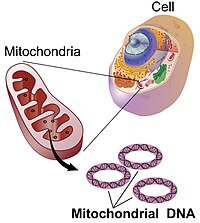
Photo from wikipedia
The chloroplast is a semiautonomous photosynthetic organelle that is essential for plant growth and development, particularly in crops via manipulation of its photosynthetic capacity and the biosynthesis of carbon skeletons.… Click to show full abstract
The chloroplast is a semiautonomous photosynthetic organelle that is essential for plant growth and development, particularly in crops via manipulation of its photosynthetic capacity and the biosynthesis of carbon skeletons. Plastid ribosomal proteins (PRPs) are crucial for the establishment of the transcription/translation apparatus during chloroplast differentiation. In this study, we isolated and characterized T-DNA-tagged rice mutants with defective chloroplasts, named prpl3, that exhibited a distinct albino seedling lethality. Transmission electronic microscopy (TEM) observations showed that the grana stacks in the mutant were not properly formed, with disrupted thylakoid structures in their chloroplasts. Chlorophyll content was also significantly reduced in the leaves of prpl3 mutant seedlings. PRPL3 contains nuclear genes encoding PRPs localized to the chloroplasts, and prpl3 represents a novel mutant presentation of an impaired PRPL3 gene. Our findings also demonstrated that PRPL3 is responsible for phenotypic alterations by generating additional mutant alleles thereof using CRISPR/Cas9 systems. Expression levels of genes involved in photosynthesis and chloroplast development, including plastidial transcription and translation and photosynthesis, were altered in the prpl3 mutant. These results collectively demonstrate that nuclear-encoded PRPL3 is indispensable for the proper development of chloroplasts in rice.
Journal Title: Journal of Plant Biology
Year Published: 2019
Link to full text (if available)
Share on Social Media: Sign Up to like & get
recommendations!